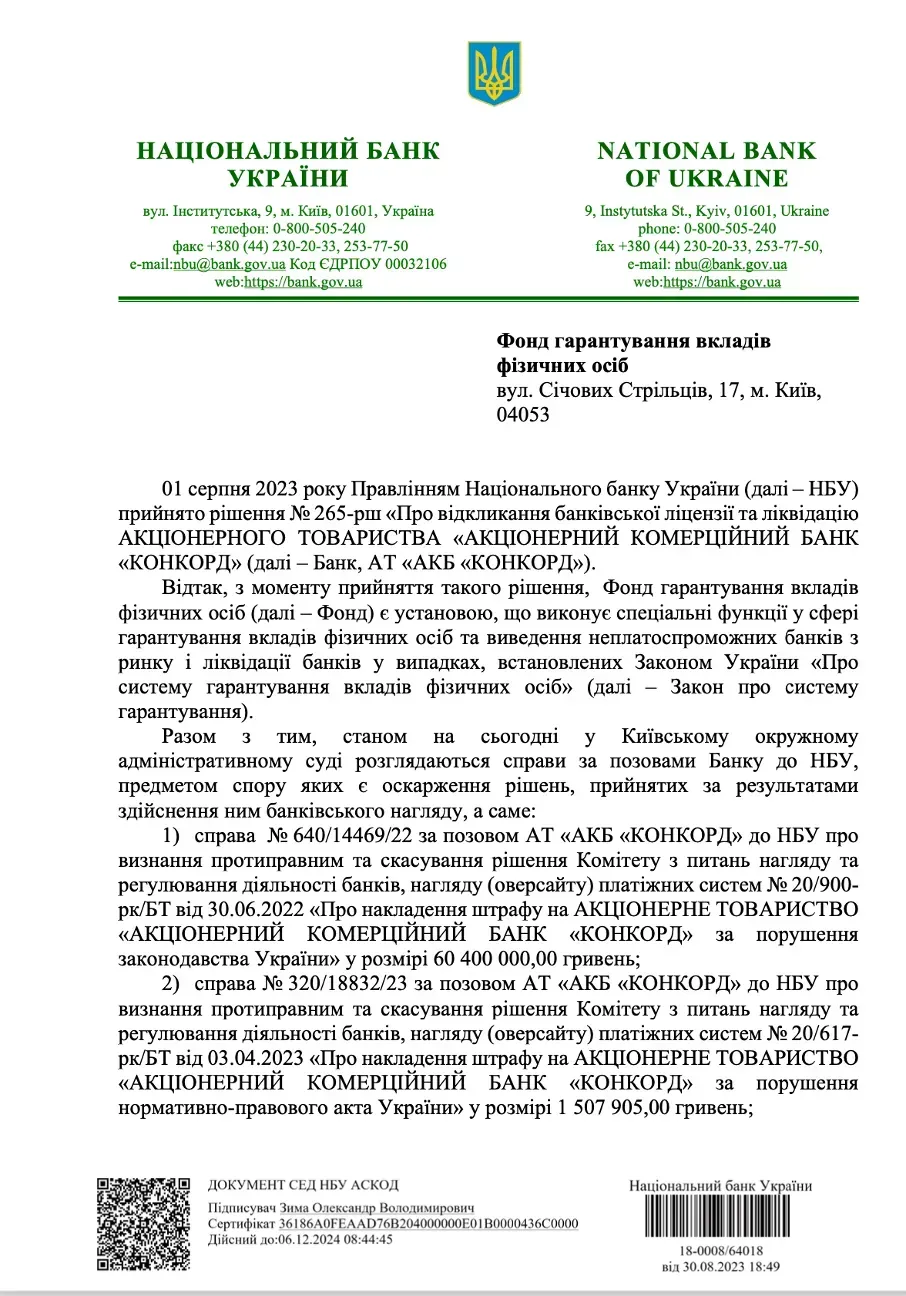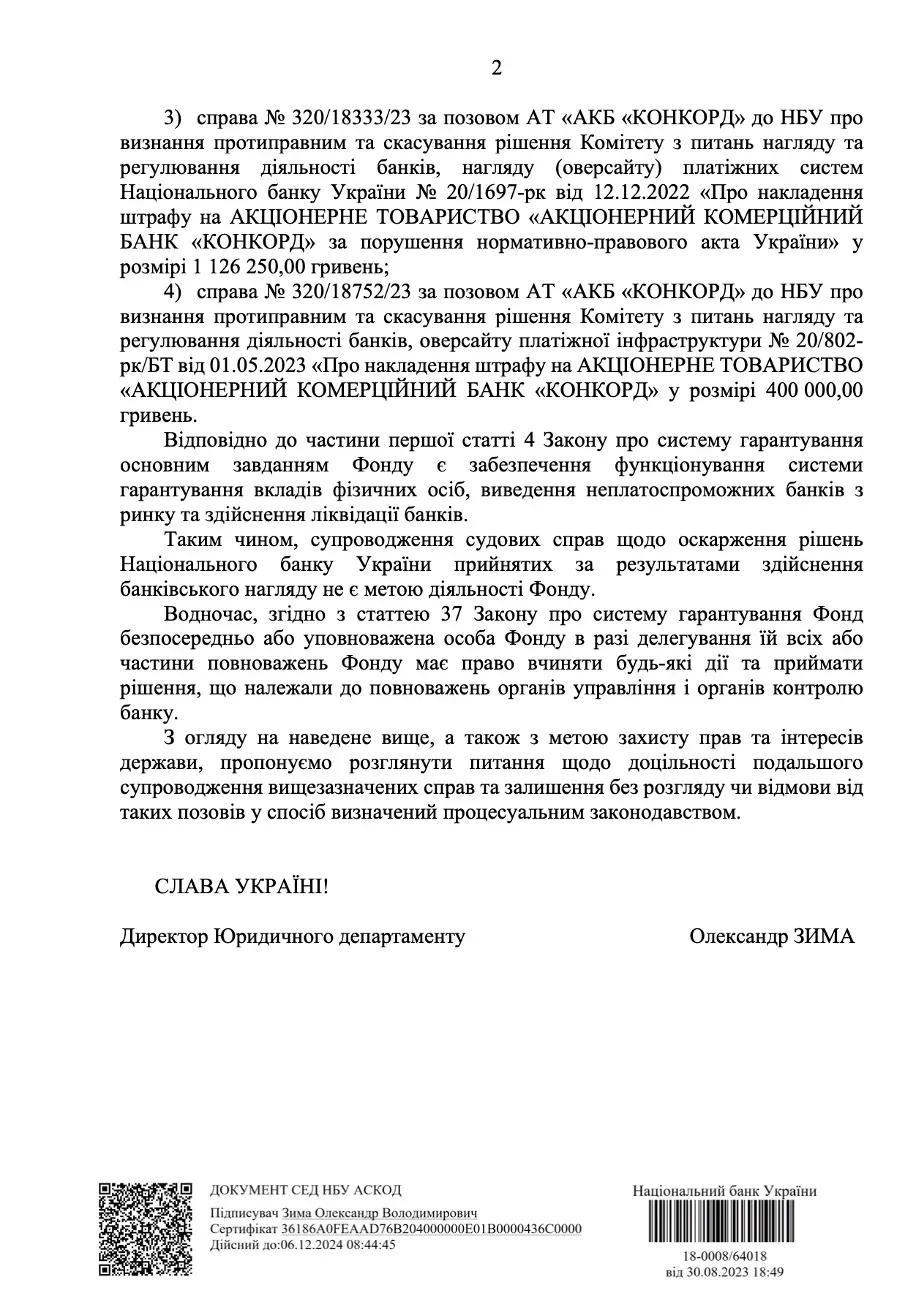Conflict of interest of the NBU's chief lawyer: why the actions of the chief lawyer Oleksandr Zyma raise questions about fairness
Kyiv • UNN
Conflict of interest of the NBU's chief lawyer: why the actions of the chief lawyer Oleksandr Zyma raise questions about fairness.

Oleksandr Zyma, who holds the positions of Director of the Legal Department of the National Bank of Ukraine and Chairman of the Administrative Board of the Deposit Guarantee Fund, is at the center of a scandal over a potential conflict of interest. His instructions to the DGF to withdraw the lawsuits filed by Concorde Bank against the NBU raise questions about violations of ethical and legal standards and have become the subject of criminal proceedings.
Oleksandr Zyma's position as Director of the Legal Department of the National Bank of Ukraine (NBU) and simultaneously Chairman of the Administrative Board of the Deposit Guarantee Fund (DGF) creates an obvious conflict of interest, especially in light of recent events. The fact is that as the NBU's chief lawyer, Zyma should have focused on protecting the bank's interests within his competence, in particular, on legal support for the NBU's regulatory activities. Instead, the combination of his roles as an official with influence over the DGF created a dangerous situation where he could act in his own interests or the interests of the NBU when giving instructions to the Fund on behalf of the NBU, which became the subject of criminal proceedings.
The case was opened due to a letter from Oleksandr Zyma to the Deposit Guarantee Fund. In the document, Zyma, on behalf of the National Bank, recommended that the Fund withdraw the lawsuits filed by Concord Bank against the NBU. These lawsuits concerned the cancellation of fines amounting to almost UAH 63.5 million and were filed before the decision to liquidate the bank.
The Deposit Guarantee Fund followed this recommendation, which, according to Olena Sosedka, deprived the bank's shareholders of their constitutional right to a fair trial.
That is, instead of defending the NBU's position in court, Zyma, probably realizing that he would lose, decided to take the easier route and use his influence.
According to the general rules of Ukrainian law and international standards, a conflict of interest arises when an official can use his or her authority in one organization to influence the activities of another organization in which he or she also has interests. In the case of Oleksandr Zyma, the conflict of interest manifested itself when he sent a letter on behalf of the NBU to the DGF recommending that the lawsuits filed by Concord Bank against the NBU be withdrawn.
Zyma, as the director of the NBU's legal department, should not have issued directives or recommendations on behalf of the NBU to other state institutions, including the DGF, to withdraw claims. This may violate the basic principles of separation of powers and independence of different institutions, as in his letter he actually used the authority of the NBU to influence the Fund, depriving Concorde shareholders of the opportunity to defend their rights in court.
Such actions may indicate a violation of ethical and legal norms, as well as provisions on conflicts of interest in public administration. Zyma should have refrained from any interference in the activities of the Deposit Guarantee Fund, especially from giving instructions that could have influenced the DGF's decision in favor of the NBU, which is controlled by the regulator.
Bringing to justice
Human rights activist Eduard Bagirov does not rule out that Zima's actions were a conflict of interest, but law enforcement officers must prove his guilt in court.
"The conflict of interest exists and must be proved in criminal proceedings and by court decisions. The head of the NBU's legal structure should be immediately dismissed from office and sentenced to 8 to 12 years in prison with confiscation of property by a court decision," Bagirov said in a commentary to UNN.
The lawyer added that if the conflict of interest is confirmed in this case, the official may be brought to several types of liability depending on the violations.
In particular, Zyma may be held criminally liable for abuse of power or position, and administratively liable if it is established that he has violated the requirements for preventing conflicts of interest.
The General Counsel may also be subject to disciplinary action. In particular, the relevant authority or the DGF's administrative board, taking into account the internal rules of the NBU and the DGF, may initiate a disciplinary investigation against the official, which may lead to his or her dismissal or other disciplinary measures.
It is worth noting that such actions call into question the independence of the Deposit Guarantee Fund, as the administrative board, headed by Zyma, should not interfere with the decision-making processes of the Fund's management, but only deals with personnel policy in the DGF. The Deposit Guarantee Fund was created to protect depositors and ensure an independent bank liquidation procedure, and its activities should be free from outside influence, including from the regulator.
The consequences of such an act by the National Bank's chief lawyer may have a negative impact not only within Ukraine but also in the international arena. It is possible that, for example, the IMF, due to its dissatisfaction with the situation, began to actively demand that Ukraine develop a procedure and hold an open competition for the position of the DGF Managing Director.
Recall
Currently, Zyma's case has been transferred from the SBI to the Pechersk Police Department in Kyiv for investigation. Law enforcement officers told UNN that they plan to interrogate the NBU's chief lawyer, and after serving him with a notice of suspicion, investigators are likely to petition the court to remove Zyma from his duties as director of the NBU's legal department.
In addition, it became known that the co-founders of Concorde, Olena and Yulia Sosedok, were recognized as victims in the criminal proceedings. According to the lawyers, this means that the investigation has recognized that Zima's actions caused damage, and the next step is to serve him with a notice of suspicion.
According to Olena Sosiedka, by his instructions, Zima deprived the bank's shareholders of their constitutional right to a fair trial.

